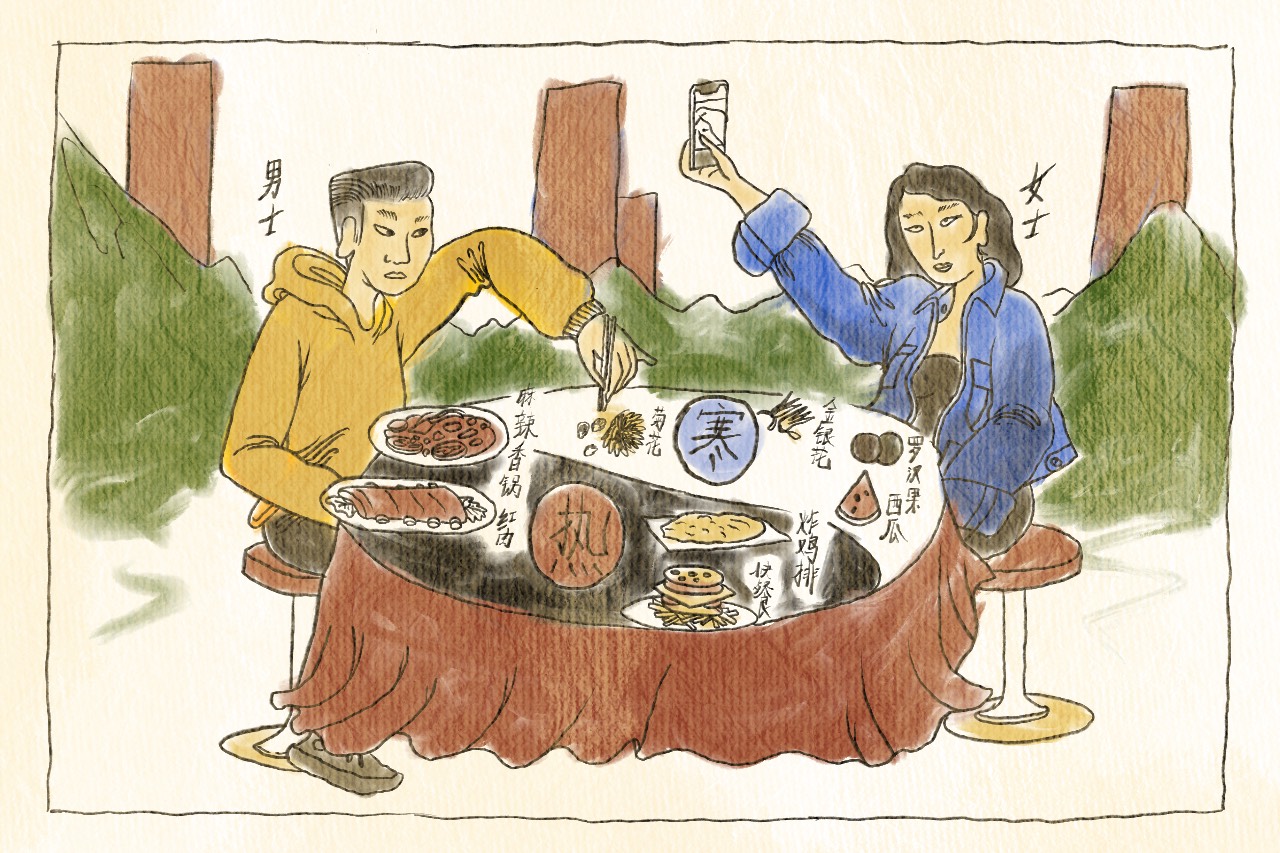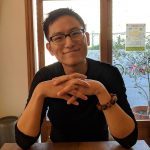Long before K-dramas, J-idols, and the Taiwanese R&B star, there was the wuxia soap opera.
I’m talking, of course, about the worlds of Louis Cha and Gu Long, stories that helped shape the formative years of my Taiwanese childhood.
The narrative arc of wuxia is not unlike the modern K-drama: handsome dolt from a well-to-do sect (think Shaolin, Wudang, Yale-NUS) has plans to live life on the straight and narrow. He’s earned the favor of his shifu (師父) and has an unspoken thing going with his shimei (師妹). He advances steadily up the ladder, all while studying the same conventional martial arts style as everyone around him.
Naturally, the dolt’s success earns him envy. He is betrayed and his shimei leaves him for his rival. He is disowned by his shifu. He is poisoned/disfigured/beaten and left for dead at a waterfall/canyon/cave.

Through sheer narrative convenience, this cave contains all the answers to the dolt’s problems, in the form of a scroll with a miracle remedy or a ‘forbidden’ martial art that helps regulate his qi, thereby raising his power level to over 9000.
Long story short: thanks to the remedies and his improved qi, the now martial arts master gets caught up in a love triangle, vanquishes his rivals, earns back the approval of his shifu, before eventually flying over the bamboo grove with the girl of his dreams.
Don’t Call it A Comeback: Millennial Problems and TCM Solutions
In reality, every generation has been telling the same truths through their own stories since the dawn of the human race. For millennials, we’ve just finally caught up when it comes to traditional remedies.
Age-old healing solutions, like traditional Chinese medicine (TCM) aren’t “making a comeback” because of a self-care and wellness fad on Instagram. Like previous generations before us, we’ve just finally come around to the idea that not everything our parents nagged us about is automatically trash.
To put this in a more concrete and modern context, here are five common millennial problems and their age-old, yet timeless TCM remedies:
1. Heatiness and the Stress-Eating Foodie
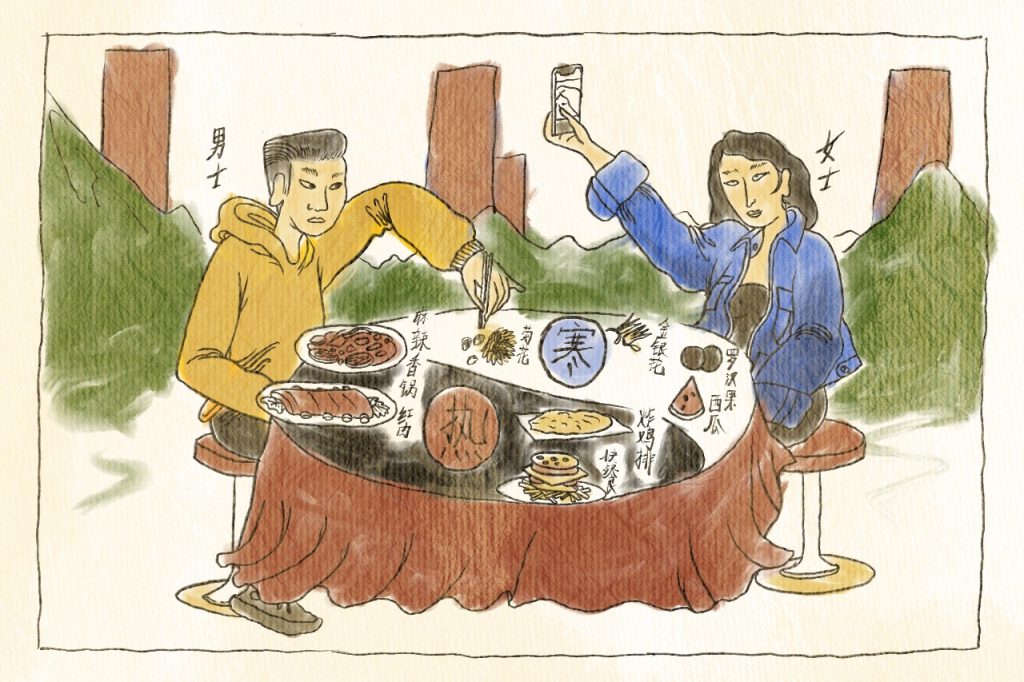
I’m sure we all wish we could be outside right now, enjoying mala xiang guo or fish head steamboat with friends. Instead, millennials are being forced to take our overindulgence and lack of impulse control behind closed doors.
During stressful times, the food we crave isn’t a nice piece of fruit or a bowl of rolled oats. No, it’s ‘heaty’ carbs like fan choi, har gow, leftover carbonara pasta and avocado toast—for Sunday breakfast. We wolf this meal down desperately, lathering ourselves up into a sweat of guilt and misery.
And since Sunday has already been lost to the food coma, we double down and order a McSpicy meal for lunch delivery and a bucket of fried chicken for dinner. We will dub it our ‘cheat day,’ one that will likely climax with a long, romantic night spent on the toilet.
TCM’s Remedy: An Herbal Balance of Yin and Yang
TCM espouses a harmonious balance between yin and yang. In practice, this means ingesting the right mix of ‘cool’ and ‘heaty’ foods.
For dispelling excess heatiness caused by overindulgence, TCM physicians recommend taking natural herbs.
Some common herbs used include chrysanthemum (菊花, júhuā), mulberry leaves (桑叶, sāngyè), dandelion (蒲公英, púgōngyīng), Honeysuckle (金银花, jīnyínhuā), Monk Fruit (罗汉果, luóhànguǒ) and Coix Barley (薏苡仁, yì yǐ rén).
These herbs are ‘cold’ or ‘cooling’ by nature and help reduce heat in the body. Classical formulas such as Gan Lu Yin (甘露饮) containing the above-mentioned herbs would also be suitable, as is snacking on commonly available ‘cool’ fruits like oranges, apples, and watermelon.
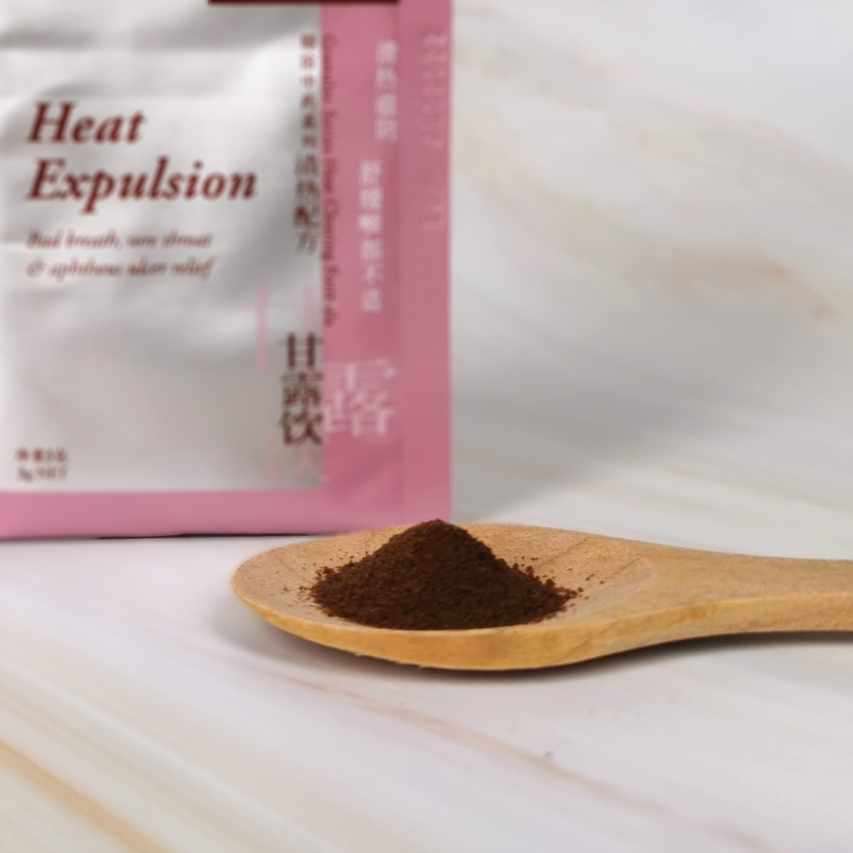
2. The Back Pain Tech Bro / Corporate Slave
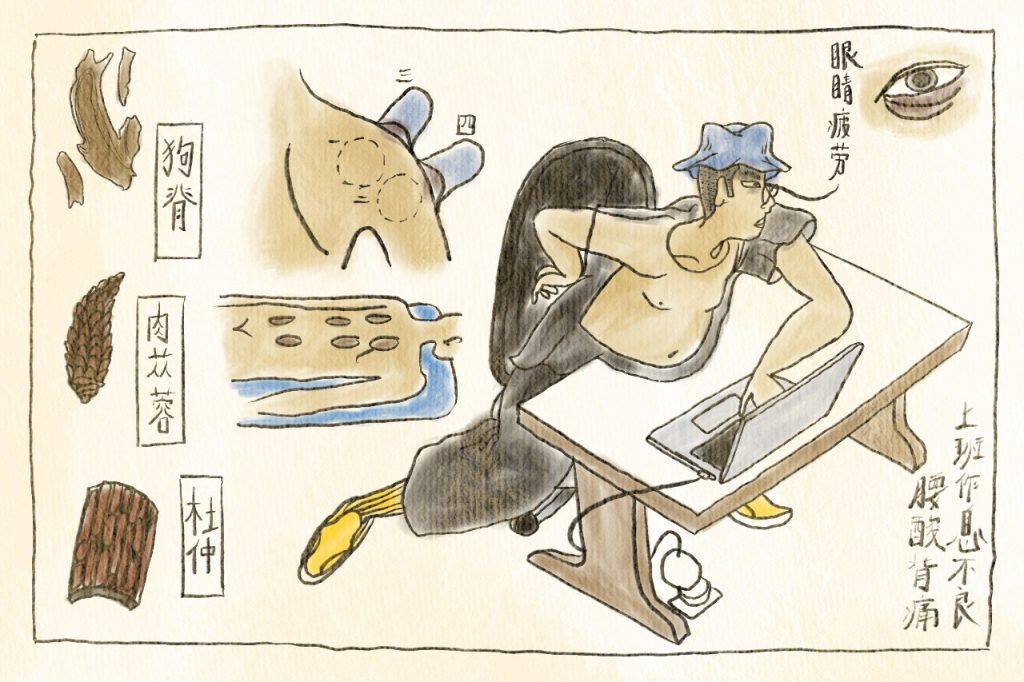
A lot of boomers think this is caused by millennials spending too much time hunched over their devices, leading to back aches and neck pain. While this is true, it’s only part of the story.
The physical aches also come from the stress of writing too many emails cc’ing your micro-managing employer and half a dozen direct line managers. Neck pain may also arise from pervasive OT culture where everyone stays late not because there’s work to be done but because of a ‘show face’ culture.
TCM’s Remedy: Addressing Deficiencies in the Blood and Qi
Whether these physical aches are from our laptops or late-stage capitalism, TCM has the solution. Our back pains and aches are mainly caused by blood stagnation or deficiency.
Mitigating pain involves clearing excess, resolving stagnation, and nourishing deficiency, especially in the blood and qi.
Depending on the diagnosis of a licensed TCM practitioner, treatments could include acupuncture, cupping, and/or herbal prescriptions like Cibot Rhizome (狗脊, gǒu jǐ), Cistanche Herb (肉苁蓉, ròucōngróng) and Eucommia Bark (杜仲, dùzhòng) to treat back ache.
3. The Menstrual Cramps Office Lady
Oddly, we somehow ran out of illustration budget to depict this in detail, but if you’re wondering why your menstrual cramps feel particularly bad recently, I’m here as a man to mansplain to you that it’s because of bubble tea. Yes, seriously, your beloved bubble tea is trying to do you in.
Bubble tea is the unholy combination of no-nos for that time of the month: it’s cold and contains a lot of artificial added sugars. According to TCM, people with PMS should avoid cold and chilled drinks/foods, especially during the menstrual period, as these foods may cause the spleen and stomach to malfunction, and the source of blood and qi will be affected.
TCM’s Remedy: Put Those Painkillers Down
In TCM, menstrual cramps can be caused by stagnation of qi and blood, obstruction of cold and dampness as well as deficiency of qi and blood. It is an unbearable lower abdomen pain before, during or after each period.
Instead of popping Western painkillers, the most widely used TCM remedy for menstrual pain is Bak Foong Pills (白凤丸, baifeng wan). Bak Foong Pills is a classical formula that has been around since the Ming Dynasty, and has served over 20 generations of women to date. It consists of a formula with over 20 types of blood and Qi tonifying, as well as pain relieving, herbs. Bak Foong Pills is known for its tedious preparation methods (each herb has its distinctive preparation method) and is available in convenient formats for young women today.
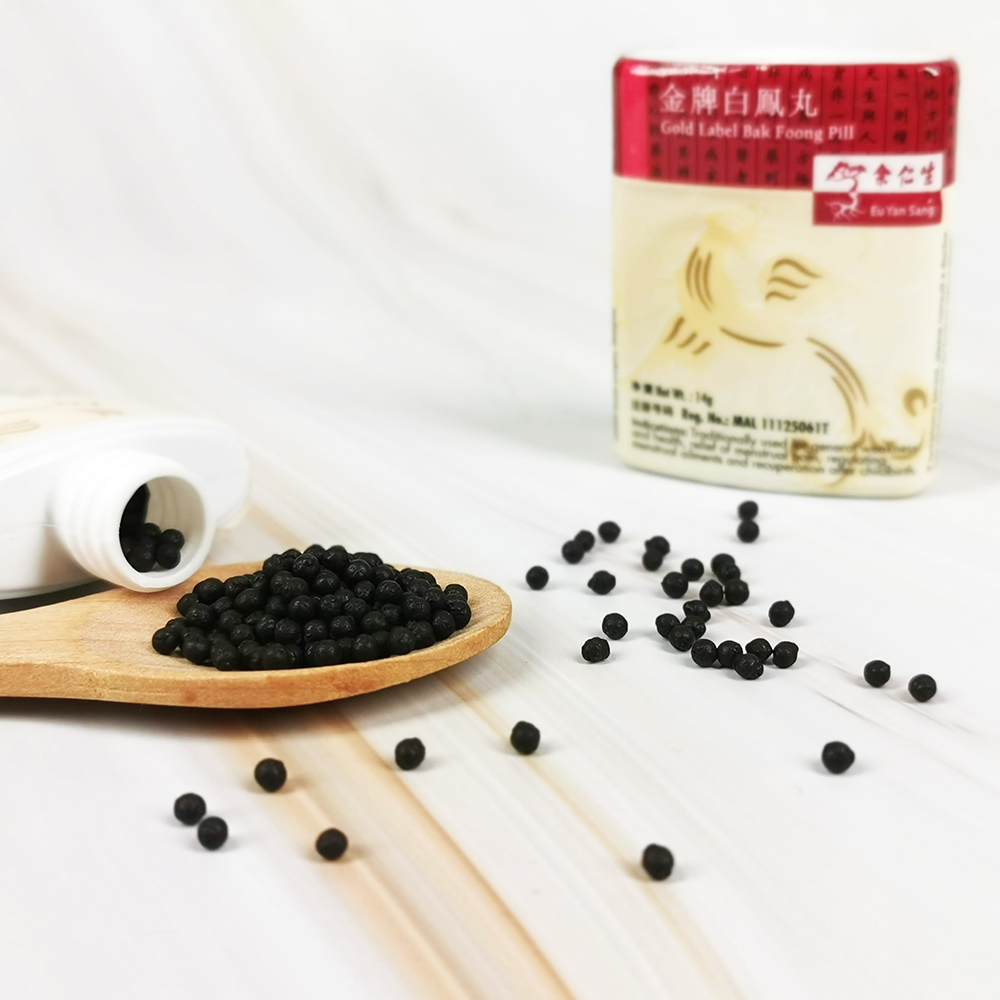
4. The High Blood Pressure Future Self
When I saw ‘high blood pressure’ on the list of common millennial maladies, my first reaction was to laugh. High blood pressure? How old do they think millennials are? That’s so far away into the future it may as well be another lifetime. Right now, I’m untouchable. I do what I want, when I want.
Luckily, we’ll never invent a time machine, or my future self may travel back in time to slap the taste from my mouth. High blood pressure is a chronic condition. In modern times, millennials start to develop high blood pressure or reach borderline hypertension conditions at a much younger age.
Mental stress, coupled with the millennial’s mostly sedentary lifestyle, and our tendencies to ‘eat our feelings’, is literally a bullet train bound for destination high blood pressure.
TCM’s Remedy: High Blood Pressure / Hypertension Management Starts at Zero
TCM calls for a comprehensive regime to tackle the root of the problem with high blood pressure. For patients on medication, TCM recommends complementing anti-hypertensive drugs with Chinese medicines, prescribed according to your afflictions.
For example, those with deficiency in the liver-yin and kidney-yin may use Liuwei Dihuang pills (六味地黄丸, liù wèi dì huánɡ wán), while those who have deficiencies in both yin and yang may benefit from Guilu Erxian glue (龟鹿二仙胶, guilu erxian jiao).
Other TCM herbs that can help in hypertension management include Hawthorn Berry, Chrysanthemum, Cassia Seed, Gastradia, and Gambir Vine.
5. The Blue-Light Smartphone Addict / Insomniac
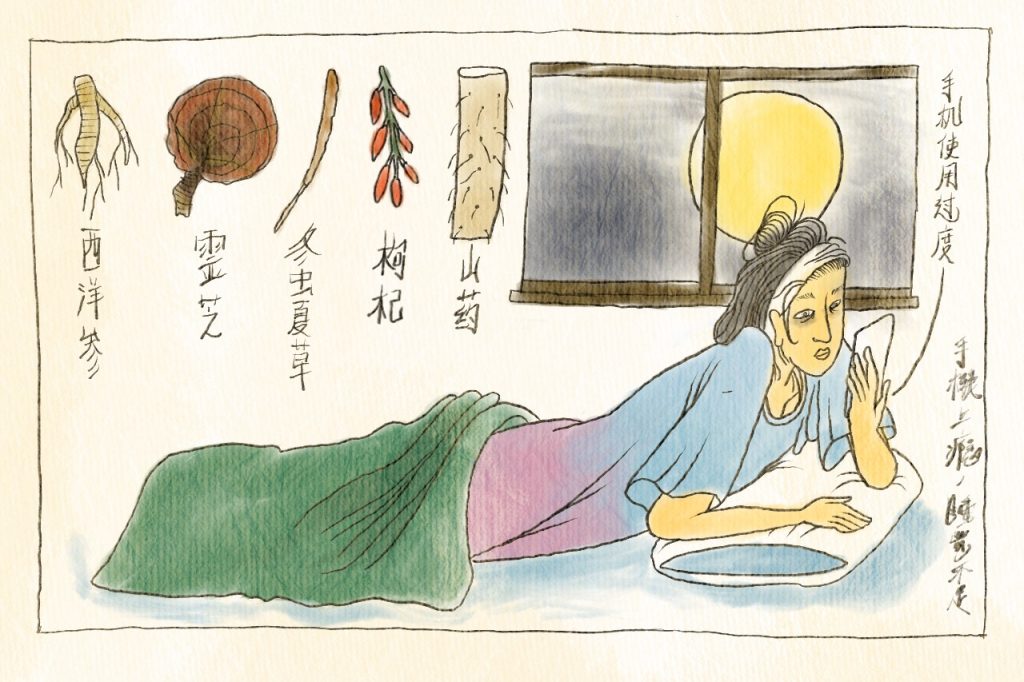
We all know the Tang dynasty poem by Li Bai, which I’ve modified slightly:
床前明月光,疑是地上霜。
舉頭望明月,低頭看[insert smartphone brand of choice]。
English translation:
Bright moonlight before my bed;
I suppose it is frost on the ground.
I raise my head to view the bright moon,
then lower it, thinking of my home village [insert smartphone brand].
Then there are those moonlit nights of insomnia. You’re feeling lonely, either waiting for some guy to text you back or just allowing enough time to pass in order to text him back.
Everyone on your Instagram feed is living more #inspiration, #motivation, #fitness lives than you. They’ve also baked more cupcakes during the circuit breaker than anyone can hope to eat without developing type 2 diabetes.
TCM’s Remedy: The ‘Root and Branch’ Philosophy of Sleep
Unfortunately, there’s no TCM cure for crippling insecurity. That has to come from a gradual and personalised process of self-acceptance and discovery.
For insomnia on the other hand, TCM looks to the concept of ‘root and branch’. The root is a dysfunction or imbalance of the fundamental substances (qi, blood, yin, yang, jing, shen), or of the major organ systems (lungs, heart, spleen, liver, kidneys).
Different types of insomnia point to problems in different parts of the body (i.e. the branches). For example, if you suffer from nightmares that keep you awake, this indicates a gall bladder meridian disorder; difficulty in falling asleep could point to an excess condition of the liver and gall.
TCM remedies of acupuncture and Chinese herbal formulas like sour date seed or gui pi wan (归脾丸) can offer fast and lasting results.
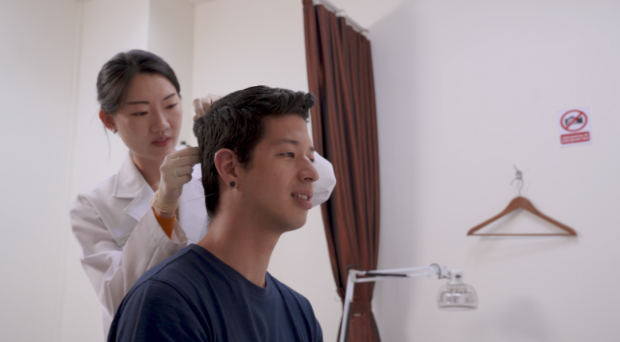
Acknowledging the Skepticism Around TCM
To conclude, TCM isn’t the panacea to all of our problems, and should be carefully considered based on individual constitutions and treatment plans. But when administered correctly via a licensed TCM practitioner, it can complement Western medicine in a variety of ways.
After all, the yin yang concept of seeking dietary balance to disharmony and excess is a sound principle that most modern nutritionists would probably agree with—though they might have differing explanations for why we should do this.
But whether you believe in TCM concepts like ‘heatiness’, ‘blood stagnation’ or ‘qi’ is almost beside the point.
I don’t need to believe everything about TCM to enjoy a piping hot cup of chrysanthemum tea on Monday morning after a weekend of overeating. ‘Heatiness’ or not, it’s a routine that makes me feel both physically and mentally refreshed.
Besides, some of these remedies are just simple and practical common sense. Something that my grandmother might say. And if there’s one takeaway from five thousand years of Asian culture and history, of which Louis Cha and Gu Long will most likely agree with, it’s to always listen to your grandmother’s advice.
That kind of wisdom is simply timeless.
This post was sponsored by Eu Yan Sang. Do you have a favourite TCM remedy? Tell us at community@ricemedia.co.

